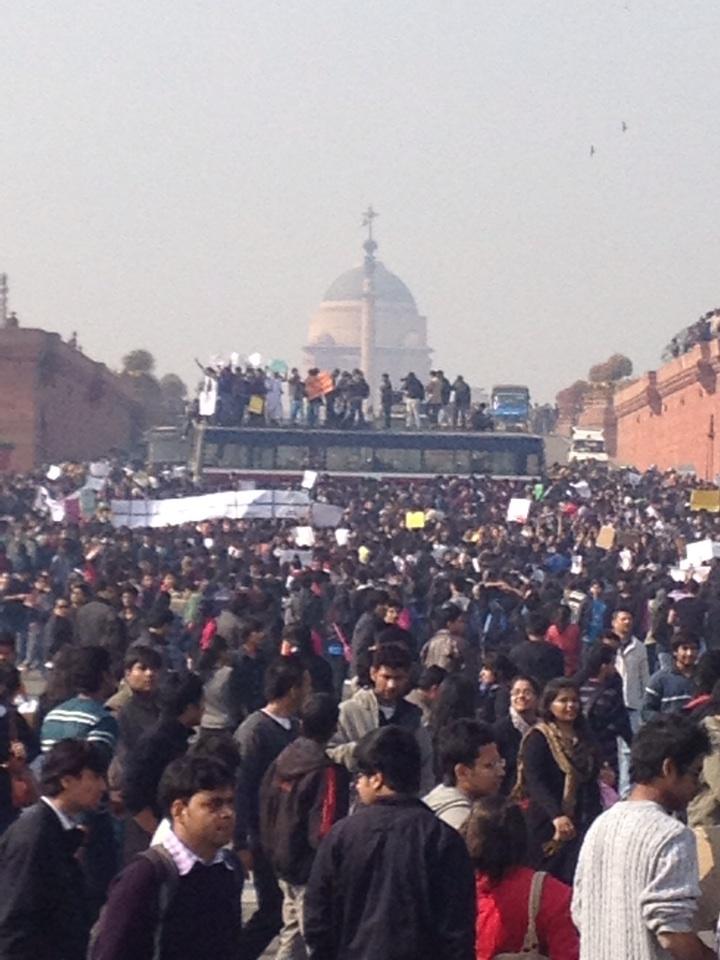“Discrimination against women begins at home”
February 5th, 2013 The outrage that followed a brutal rape in Delhi could be a turning-point in a democracy where hundreds of unreported rape cases each month reveal social failure and a misogynist mind-set, writes Tabish Azeem, 22, a Commonwealth Correspondent from Gaya in India.
The outrage that followed a brutal rape in Delhi could be a turning-point in a democracy where hundreds of unreported rape cases each month reveal social failure and a misogynist mind-set, writes Tabish Azeem, 22, a Commonwealth Correspondent from Gaya in India.
On the chilly winter night of December 16th, a 23 year old woman accompanied by a male friend walked out of a South Delhi mall. The duo boarded a private bus.
To their shock, the only other passengers were a bunch of hooligans, and the girl was molested. The friend resisted, but in vain. The girl was raped and brutally tortured as the bus was driven around the roads of New Delhi in an act of brazen hideousness. After a two-hour nightmarish ride, the duo were dumped.
While the victim fought for her life in a Delhi hospital, the nation erupted on streets in support of the girl, who went by the pseudonyms ‘brave heart’ and ‘India’s Daughter’. The police were swift to nab the culprits, and the trial has begun. But after a two-week struggle Jyoti, the victim passed away.
There’s no denying that the incident has deeper underpinnings. It is reflective of a misogynist mind-set. In a country where female foeticides are rampant and the girl child is discriminated against, where dowry is a norm and the malaise of domestic violence widespread, rape is not just a policing failure, it’s a social failure.
In the aftermath of the incident, millions came out in support of the victim and social media went afire sympathising with the girl. The issue remained the focal point of Indian media for weeks. The nation-wide movement has been a turning point in India’s young democracy. It was perhaps the first time that women’s rights were debated vocally, and has now become a central issue. It showed the citizenry the power of its active participation in governance. An online petition campaign run by www.change.org garnered over 650,000 signatures.
“The online petition did serve as a pressure point, but more immediate was the magnitude of the street protests throughout India. I doubt that the government would have acted to set up the Justice J.S. Verma Commission if it hadn’t been for these protests,” said Namita Bhandare, petition author and senior journalist, in an email to this correspondent.
The government constituted a committee under Justice Verma to suggest amendments to the Criminal Act in light of rising violence against women. Recommendations include police reforms, transparency in governance, smooth registry of complaints, sensitive policing and review of the draconian AFSPA (Armed Forces Special Powers Act) which is at force in conflict regions like Kashmir and Manipur. Justice Verma suggested the need to review AFSPA in conflict zones, so that sexual violence against women perpetrated by armed forces can be brought under ordinary law. The government has examined the recommendations and issued an ordinance to implement some suggestions.
Harvard Professor Michael Sandel recently held a discussion on India’s National Knowledge Network, connecting students across 500 institutions through the web. An interesting mix of ideas came out when Professor Sandel discussed issues about women’s rights in India. While there was unanimity that violence against women is both a law and order and a societal failure, many believed that police have failed to make women feel secure. The audience at large noted that women empowerment in its true essence cannot be a reality in India until the women are not only safe, but also have the freedom to exercise their rights, without societal or familial interference. In India’s patriarchal society, discrimination against women begins at home.
But the sad fact remains that the outrage and subsequent action in the Delhi rape case remains an isolated incident. In the weeks since then, acts of violence against women have continued. Far from the well-lit hallowed power corridors of New Delhi, away from the gaze of spotlights, brutal incidents of rape continue unnoticed. These incidents barely manage to get a mention in the bottom scrolls of News Channels and jostle for space on the side columns in newspapers’ inside pages. No candle light vigils, no agonised shouts from celebrities and no social media outrage. Yes, it makes one wonder if the tribal girl sexually assaulted and murdered in the eastern state of Orissa, or the lower caste woman molested by upper caste men in rural Haryana, are citizens of a lesser India. While the country vies for the harshest punishment to the Delhi Gang rape accused, every month hundreds of rape cases across the country are not even reported to police. We take pride in being the world’s largest democracy, but a look in the mirror suggests that our hypocrisy prevails over our democracy.
Photo: Demonstration against Delhi gang rape case on Raisina Hills, New Delhi. Courtesy of Namita Bhandare
…………………………………………………………………………………………………………………………………………………………
About me:
I am an undergraduate senior in Chemical Engineering at the National Institute of Technology, India. I keenly observe almost everything that makes news, and follow political and economic affairs very closely.
I have pursued a research internship at the prestigious Indian Institute of Management, where I worked upon the education sector; a field close to my heart. Apart from being a social media enthusiast, reading and quizzing count among my hobbies and writing is my passion!
………………………………………………………………………………………………………………
Opinions expressed in this article are those of the author and do not necessarily represent the views of the Commonwealth Youth Programme. Articles are published in a spirit of dialogue, respect and understanding. If you disagree, why not submit a response?
To learn more about becoming a Commonwealth Correspondent please visit: http://www.yourcommonwealth.org/submit-articles/commonwealthcorrespondents/




